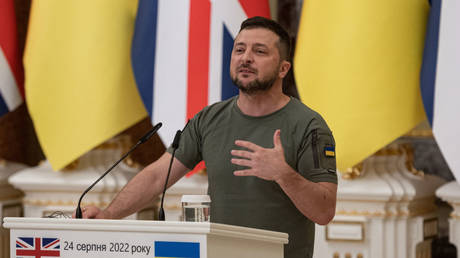Kiev denies Moscow’s ‘dirty bomb’ allegations
Kiev has denied Moscow’s allegations about its plans to use a “dirty bomb” for a false-flag attack

Kiev denies Moscow’s ‘dirty bomb’ allegations

Ukrainian President Vladimir Zelensky has denied Moscow’s allegations that Kiev was preparing a false-flag attack with the use of a “dirty bomb,” and has pointed the finger at Russia instead.
Zelensky was commenting on what he called “a phone carousel” by the Russian Defense Minister: on Sunday, Sergey Shoigu shared with his French, Turkish and British colleagues his concern over “possible provocations by Ukraine using a ‘dirty bomb.’” Russian state news agency RIA Novosti earlier reported that the goal of such a provocation would be to accuse Moscow of using weapons of mass destruction in a ploy to “launch a powerful anti-Russia campaign”.
In a video address on social media, Zelensky claimed that “wherever Russia has brought death and degradation,” Ukraine is “returning a normal life.”
“And there’s only one subject who can use nuclear weapons in our part of Europe, and this subject is the one who ordered comrade Shoigu to call somewhere,” the Ukrainian leader said.
So-called “dirty bombs” use conventional explosives along with radioactive material. While it could not rival a nuclear warhead in terms of power, such a device could disperse a radiation cloud around a radius of several kilometers from its explosion.
Zelensky expressed confidence that “everyone understands” who is “the source of everything dirty that can be imagined in this war” and called on the world to react “in the toughest possible way” when it comes to “another escalating step” by Russia.
Earlier on Sunday, Ukrainian Foreign Minister Dmitry Kuleba also commented on Moscow’s allegations, saying that “Russian lies” about a “dirty bomb” “are as absurd as they are dangerous.”
“Firstly, Ukraine is a committed NPT (non-proliferation treaty) member: we neither have any ‘dirty bombs’ nor plan to acquire any. Secondly, Russians often accuse others of what they plan themselves,” the minister said.
According to the British Defense Ministry’s readout of the conversation between its head, Ben Wallace, and his Russian counterpart Shoigu, the Russian minister “alleged that Ukraine was planning actions facilitated by Western countries, including the UK, to escalate the conflict in Ukraine.” Wallace “refuted these claims” and warned Shoigu that “such allegations should not be used as a pretext for greater escalation,” the ministry said.
Earlier, in an interview with Deutsche Welle, NATO Secretary General Jens Stoltenberg said that any use of nuclear weapons by Russia in Ukraine will lead to “severe consequences” for Moscow, but refused to reveal details on these. At the same time, he said that the risk of such a Russian attack remains low.
Numerous Russian officials have been insisting that the country wasn’t threatening anybody with nukes and have pointed to Russia’s military doctrine, which states that nuclear weapons may only be used if such arms or other weapons of mass destruction are being deployed against the state, or if it is faced with an existential threat from conventional arms.












